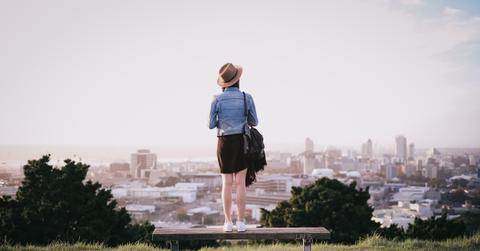How I Pulled Off A Zero-Waste Lifestyle For A Full Year
When I moved to Amsterdam for a year, I saw the transition to a new country as a perfect opportunity to try living zero-waste. Here's how I pulled it off.
Updated May 14 2019, 4:46 p.m. ET
Waste is a hot topic in the world today, and for good reason. In 2050, there will be more plastic than fish in the oceans, with one truck’s worth of waste being dumped into the sea every minute. I wanted to know if—and how—this might be prevented.
When I moved to Amsterdam in 2015 for my masters studies, I saw the transition to a new country as a perfect opportunity to commence some more environmentally friendly habits. One change begot more change; before I knew it, I spent a full year living a zero-waste lifestyle.
Here’s how I pulled it off, and how you can too.
I learned to stop feeling guilty.
Guilt about doing something wrong or messing up hindered my initial journey toward becoming zero-waste. It is so important to understand that transitioning to zero-waste does not happen overnight. You will make mistakes, and it’s perfectly fine. Remind yourself that we don’t live (yet) in a world that makes it easy (or at all convenient) to live without producing a bunch of trash.
So don’t feel guilty: The fact that you’re trying is already fantastic!
I went through my own garbage and took note of my habits.
This may not be the most glamorous part of the process, but trust me: It is definitely necessary.
To cut down on your waste, you need to understand what you’re throwing away. And how better to do that than by exploring your bin? I classified my waste into four categories that I ranked from biggest to smallest trash production:
I discovered a vital trick early: Start with what’s easy.
Starting small gave me tiny, daily victories that quickly grew into bigger accomplishments.
I found that the easiest transitions to zero waste included the following:
Once I felt comfortable, I pushed it a step further.
Taking easy, realistic steps was incredibly important to my process. These steps turned into leaps the further along I got — and the more accustomed I grew to my new habits. Transitioning to a low-waste lifestyle should not be excruciating! This is supposed to feel exciting and enjoyable! Here are the changes I made once I was comfortable with the changes outlined above:
I dealt head-on with misconceptions about the cost of zero-waste lifestyles.
A common misconception is that the zero-waste lifestyle is expensive. This depends on the way you look at it. True, the tools that usually allow you to be zero-waste are costly: plastic-free containers, water bottles, sanitary products. However, these are largely one-time purchases that save you tons of cash in the long run.
For example:
I learned first-hand all the things I wish someone had told me.
You do not have to buy everything. The magic of the internet is that you can find DIY tutorials for almost anything. For instance, I sewed my own vegetable bags from an old cotton sheet (and believe me, I am not an expert at sewing). You can easily make sanitary towels, toothpaste, or a wide variety of beauty products. You also do not have to buy a complete zero-waste equipment: you probably already have cutlery at home, no need to buy special takeaway ones, and same for food containers.
You do not have to buy everything in one go. It took me six months to get the essentials. Today, I occasionally still buy things that I need to go one step further. It is a constant improvement.
Do not be afraid to ask. When I started to ask bartenders not to put straws in my drink or waiters to put food in my container, I was not feeling confident about my move. Nevertheless, you realize with time that people often say yes and are even curious about why you’re doing that. So it’s all good!
Do not beat yourself up. I cannot emphasize enough how important it is not to beat yourself up when things do not go according to plan. Yes, sometimes you’ll buy plastic when you don’t want to, you’ll forget your reusable coffee cup, or you will be in a place that does not allow you to purchase things the way you wish. And it’s fine. Focus on what you’ve been doing so far (see what you did with a reusable water bottle only!?), and learn from your mistakes.
I have now moved to London, where being zero-waste is much harder. So I stick to what I’ve learned, use my essentials, and just try my best to live low-waste. What matters in the end is to try. Good luck!
